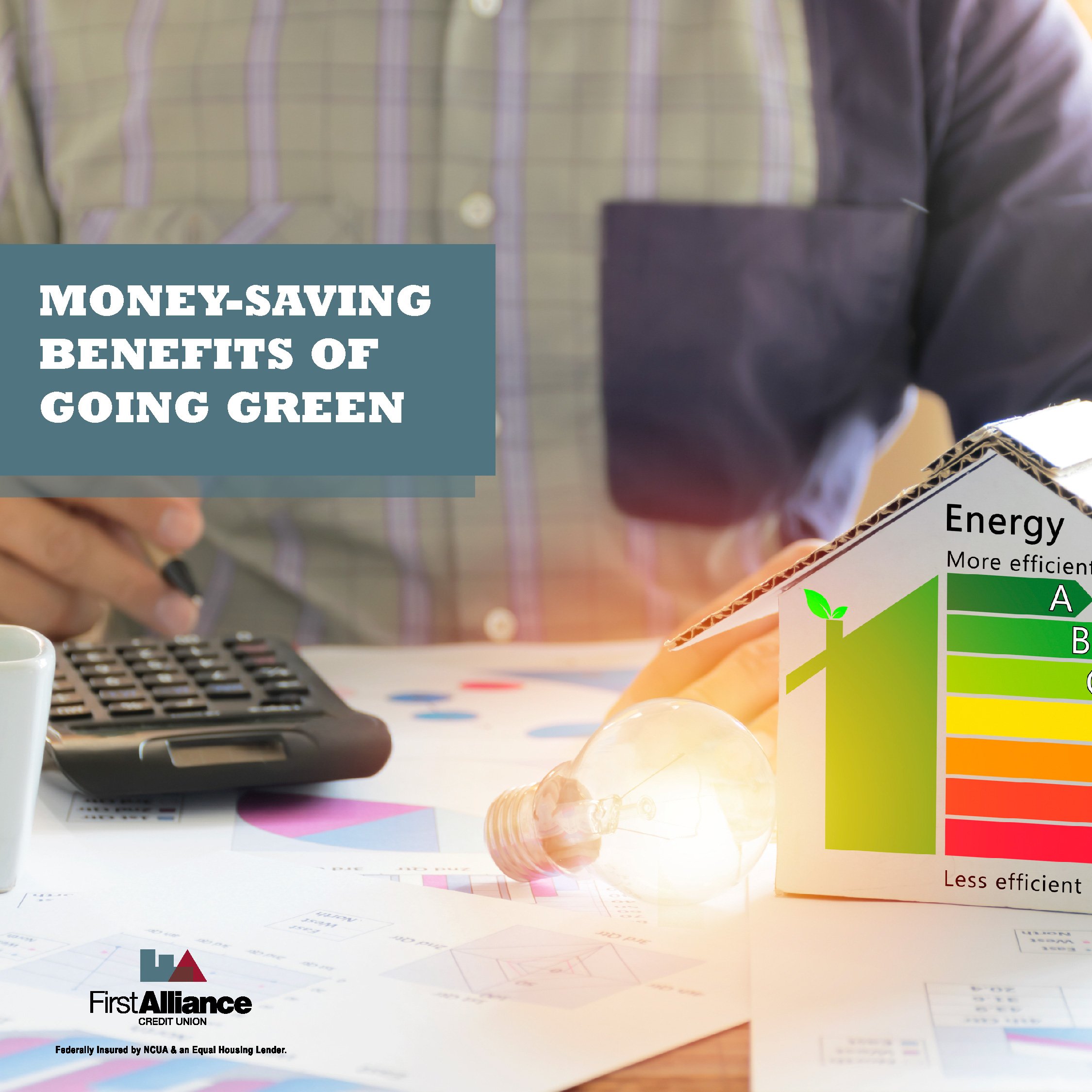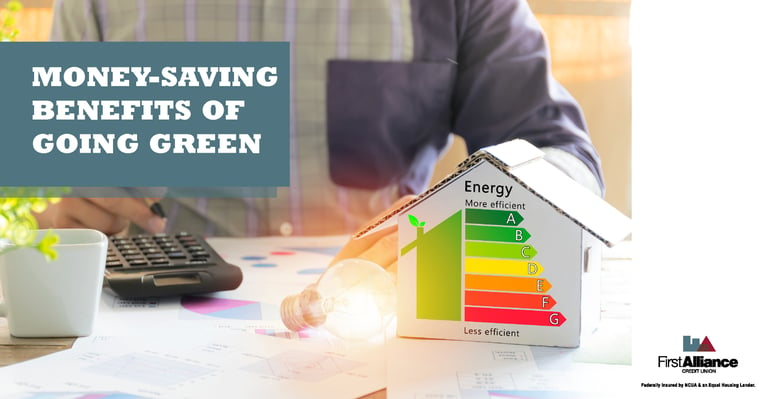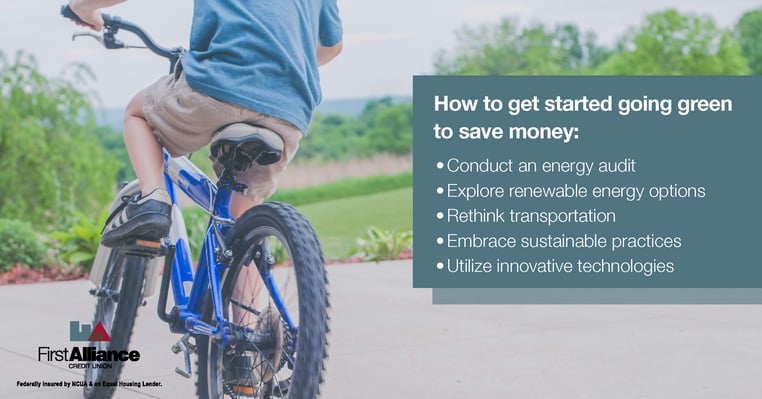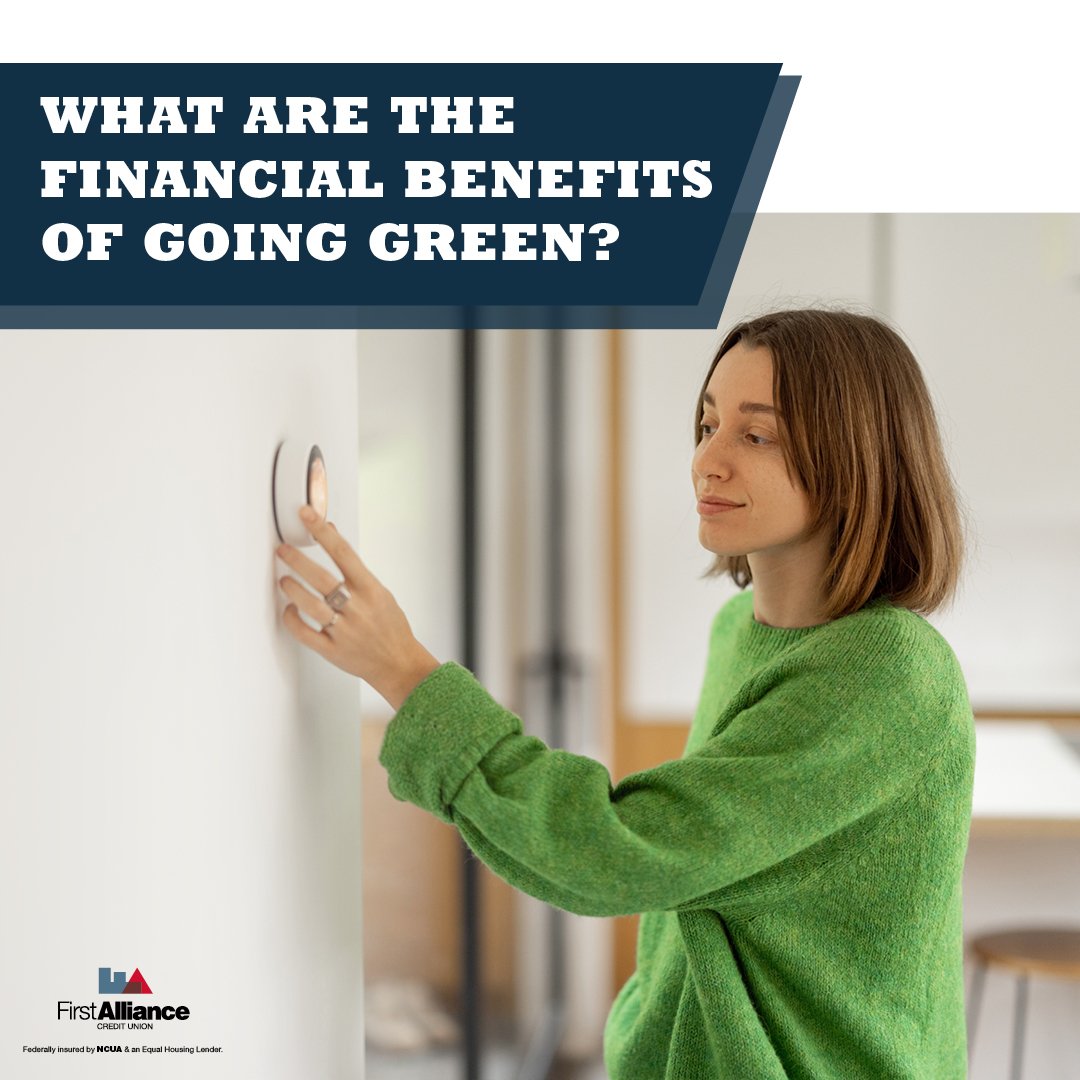4 Ways to Get Ahead Financially in Fall
As every Midwesterner knows, fall is full of opportunities. These opportunities range from chances to have some seasonal fun, like going apple...

In today's world, with a growing awareness of environmental issues, more and more people are looking into ways to embrace a greener lifestyle. Beyond the positive impact on the planet, one intriguing question often arises: Does going green save you money?
To answer this important question, let's delve into the concept of what it means "go green", explore areas where substantial savings can be realized, and provide practical steps to get started on your money-saving, eco-friendly journey.
Going green is more than just a trendy catchphrase; it's a commitment to adopting sustainable practices that reduce your environmental impact. It involves embracing sustainable living by conserving resources, reducing waste, and minimizing your carbon footprint.
Essentially, going green is about making choices that prioritize the well-being of the planet and its resources. This can encompass various aspects of daily life, from energy consumption and waste reduction to eco-friendly transportation and mindful choices when buying everyday things. By going green, you can contribute to the health of the planet while also enjoying financial benefits.
Adopting a green lifestyle not only provides immediate cost savings but also offers long-term financial benefits. Before we explore more specific examples of how to go green, here are some of the long-term financial advantages of embracing sustainable practices:
By adopting sustainable habits and making eco-friendly choices, you can not only save money in the short term but also enjoy long-term financial benefits. Throughout this article we will explore these benefits in more detail.
There are key several areas where you can save money by going green. Let's review the four most impactful areas of going green and how you can find potential cost saving.
One of the primary areas where going green translates into significant savings is in energy consumption. By investing in energy-efficient appliances and LED light bulbs can reduce your electricity bills. While improving your home's insulation, using programmable thermostats and sealing air leaks can help you save on heating and cooling costs. Additionally, switching to renewable energy sources such as solar power can lead to long-term savings and even generate no electricity bill through incentives like net metering.
Cutting down on traditional transportation methods in favor of eco-friendly alternatives can result in substantial savings. This includes using public transportation, carpooling, or biking. You can also save by choosing to drive fuel-efficient vehicles, hybrid cars, or fully electric vehicles the next time you buy a car. These choices not only reduce your carbon footprint but also save money on fuel and maintenance costs.
Embracing a zero-waste or reduced-waste lifestyle can also contribute to financial savings. By minimizing single-use products, as well as prioritizing recycling and composting, households can decrease their overall spending on disposable items and improve waste management. Additionally, reducing water consumption is another way to save money and be green. You can install low-flow fixtures, fix leaks promptly, and practice other water-saving habits to significantly lower your water and sewer bills.
Adopting a more minimalist lifestyle and reducing waste can save you money, by making mindful choices when purchasing products can positively impact both the environment and your wallet. Opting for durable, eco-friendly products may have a higher upfront cost, but their longevity often results in long-term savings. Additionally, buying locally sourced goods can support the community and reduce transportation-related costs.
By incorporating some of these recommended practices into your daily life, you can make a positive impact on the environment and enjoy cost savings. 
If you're interested in saving money through green practices, here are some simple steps you can take to get started without having to change your entire lifestyle all at once.
On your own you can begin by identifying areas in your home where energy efficiency can be improved, simple changes like switching to LED bulbs, sealing drafts, and upgrading insulation can make a significant difference. But you can take things a steps further, consider having a comprehensive energy audit completed to help pinpoint specific improvements.
An energy audit is a comprehensive assessment of a building's energy consumption and efficiency. The primary goal of an energy audit is to identify areas where energy is being wasted and to recommend measures to improve energy efficiency. This process helps individuals, businesses, and organizations understand their energy usage patterns and provides insights into how to reduce energy consumption and costs.
Exploring renewable energy sources for your home, such as solar panels or even geo-thermal heat pumps and wind turbines, can be an excellent option for going green and saving money. While many of these options have a higher upfront cost, the tend to be cost effective in the long run.
Plus, certain states and cities many offer incentives, rebates, or tax credits for adopting these technologies, making the initial investment more affordable. When considering renewable energy options for your household, you'll also need to consider factors such as the local climate, available space, upfront costs, and potential savings over time.
Take a moment to evaluate your daily commuting habits, making conscious choices about how you travel can have a significant impact on both the environment and your wallet.
Moreover, for those interested in a sustainable long-term investment, transitioning to an electric or hybrid vehicle can result in significant savings on fuel and maintenance down the line. Exploring these alternative transportation options not only minimizes your environmental impact but also lowers your commuting expenses.
By incorporating sustainable practices into daily life, you can not only contribute to environmental conservation but also experience financial benefits over time. Small changes can add up to significant savings, and adopting a mindful and sustainable approach to various aspects of life can lead to a more cost-effective and eco-friendly lifestyle.
These practices are varied, making it easy to adopt ones that are fit your current habits. For For example, adopting a minimalist lifestyle by decluttering and downsizing possessions, saving money on storage and maintenance. You can learn basic repair skills to fix minor issues with appliances, clothing, or furniture, extending their lifespan.
Another example is to consider purchasing used items or repurposing existing ones instead of always buying new, reducing both expenses and waste. Plus, proper waste disposal practices can save on trash disposal costs and contribute to environmental conservation.
Overall, embracing sustainable practices, looking differently at your commute, finding ways to reduce waste, and conducting and energy audit on your home can not only lead to cost savings in the long run, but a healthier planet for everyone.
Lastly, it's important to consider all of the advancements in technology that have made it easier than ever to save money through green practices. Here are some innovative technologies that can help you achieve green savings:
By utilizing these green technologies, you can maximize your savings and contribute to a more sustainable future.
Going green is not only a positive step towards environmental stewardship but can also lead to substantial financial savings. By focusing on energy efficiency, sustainable transportation, waste reduction, and mindful consumer choices, individuals can embark on a journey that benefits both their wallets and the planet. Start small, make gradual changes, and witness the positive impact of going green on both your finances and the world around you.
If you’re thinking about getting more eco-friendly, become a member of First Alliance Credit Union today. You can get pre-approved for an auto loan that will let you get an energy efficient car, and you can take out a loan or line of credit that will help fund your green home improvement projects. Plus, we offer a robust online and mobile banking platform, with free eStatements, to save you from having to travel to a branch.

As every Midwesterner knows, fall is full of opportunities. These opportunities range from chances to have some seasonal fun, like going apple...

It’s no secret that everyone gets more green in their lives on St. Patrick’s Day. People wear green clothes, drink green beer and decorate with green...

When people talk about the advantages of “going green,” or being more ecologically friendly, they usually discuss the moral and ecological benefits....